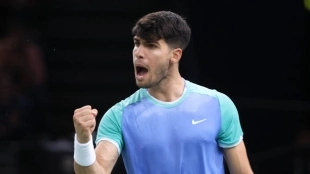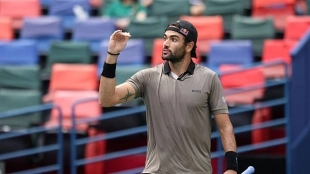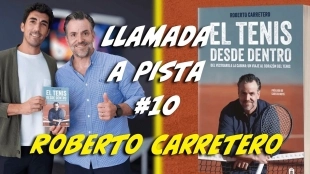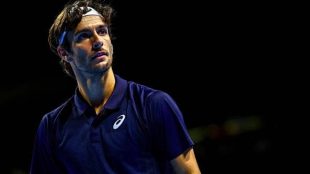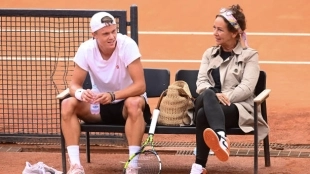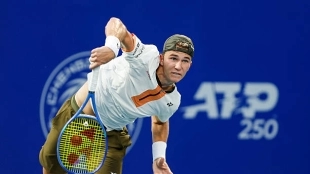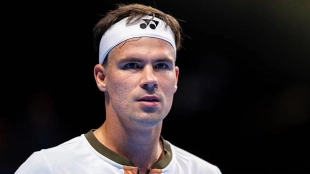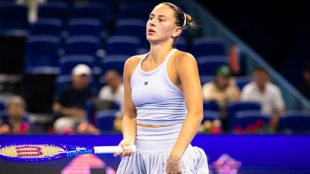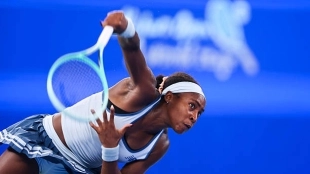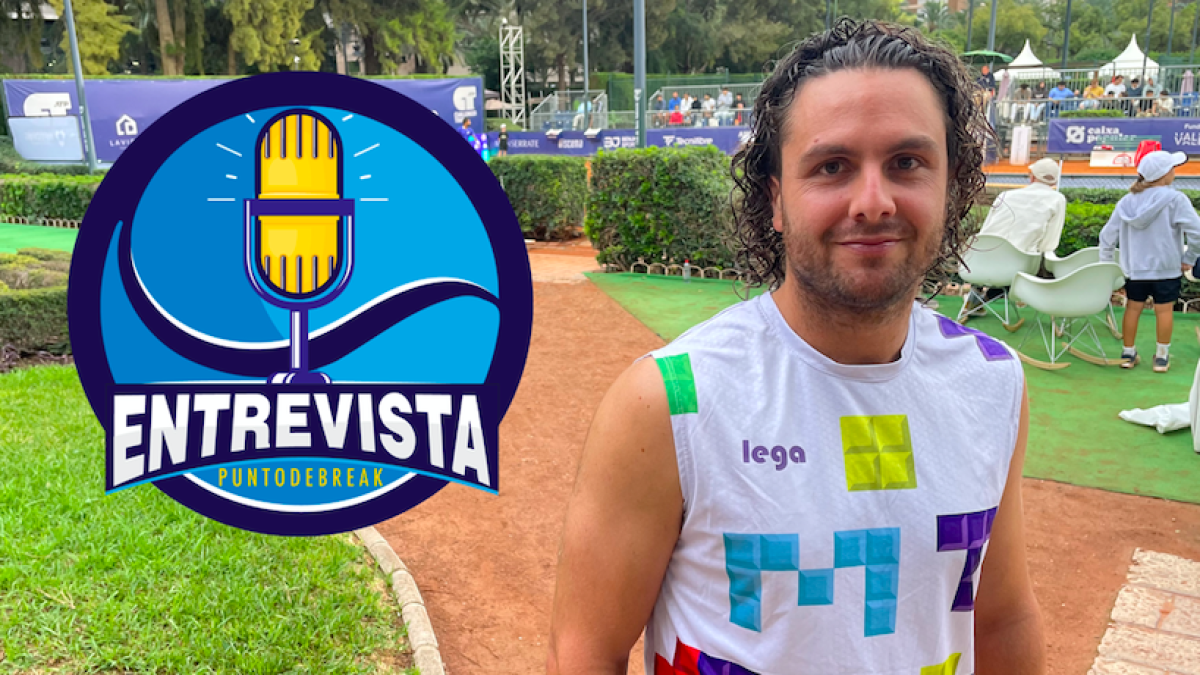
One of the most enjoyable experiences this season will be sitting down with Marco Trungelliti to talk about the toughness of the circuit and the purity of the competitor, an interview without masks where we highlight the continued challenge of dedicating oneself to this sport professionally.
It's possible that Marco Trungelliti (Argentina, 1990) is the only player I've crossed paths with at every level of the pyramid: Grand Slams, ATP events, Challengers, and Futures. And yet, I had never had the opportunity to sit down and get to know him. This debt was paid last week at the Copa Faulcombridge in Valencia, where the Argentine reached the quarterfinals, a golden opportunity to 'debut' on Punto de Break and share one of the most romantic stories on the circuit.
- The story of Marco Trungelliti, a tennis survivor
Few battle profiles come to mind like Trungelliti's, a tennis player who drove 10 hours with his grandmother to compete in Roland Garros in 2018. An Argentine who settled in Barcelona to make this suffocating circuit more bearable. Husband, father, and professional player, committed to each of his causes, yet very aware of the hierarchy among them. At 35, he keeps dreaming, not only of breaking into the top 100, but of being a better player than the day before. An interview that uses sport to talk about overcoming challenges and the love for what one does. About life itself.
What do you think of the club? Do you see the potential to host an ATP tournament here?
I came to play two years ago and since then, they have improved a lot in terms of the courts, although they still would need to have some more training courts. I understand that there are always members playing, but if the goal is to move up in category, that space for the members should be reduced. It is a beautiful tournament, well organized, the Central Court is very nice, the hotel is decent, the food is fine... We also don't need luxury, but to look for something more, it would be interesting to have cold and hot baths, although these are just small details.
You reached the quarterfinals here. Is it challenging to control your mind as you advance in the draw?
It doesn't help much to look ahead, although I do like to calculate, more for motivation's sake. Nowadays, I can control that anxiety, but years ago, it was very hard for me. I suffered mental ups and downs that made me be anywhere but there, but this is a very personal matter. Now I have a certain maturity that I didn't have before, so I can allow myself to think about some future circumstances, but always staying grounded.

You are seen from the outside as a passionate tennis player, dedicated to this sport. Do you approach playing a Grand Slam with the same enthusiasm as a Futures tournament?
I have been doing this all my life, now with much more awareness. I have a passion for competition, more than for tennis itself. This has turned into a family project a long time ago, along with my wife and son. I need to have things very clear every time I leave home to give my best. If I come to Valencia, it's because I know I can win, although ultimately what matters is the level of competitiveness I show on the court. If I come and lose the first match due to a lack of competitiveness, the problem becomes bigger. These last few years, I set myself that goal, to be competitive every week, even if my body gives out that week, but I have to walk off the court having given it my all.
You play in over 30 tournaments a year, do you go to all of them with the mentality to win? Or do you travel some weeks thinking let's see what happens...
The 'let's see what happens' mentality never worked for me. Right now, at the level everyone plays, it's impossible to travel with that mindset and end up in a semifinal or rely on luck. That might happen to you once a year at most. If I go to the US Open qualifiers, obviously, thinking about winning the tournament is unrealistic, although there is always hope. You have to set achievable goals and then keep fighting if everything goes well. For example, my last two tournaments in Portugal were very important; doing well would have brought me close to the top 100, but I lost in the quarterfinals in both, even though I had both within my grasp. It's not that I lose a match and want to chop off a leg, as I used to feel before, but it's true that letting a good opportunity slip away can weigh heavily the following week.
In tennis, you lose much more than you win, how do you deal with defeat?
It was very difficult for me to understand it, I think I began to understand it three years ago. I lacked maturity, I struggled for many weeks after losing an important opportunity. If I let slip a match that I had in my hands, then I would be down for a month, until finally getting back to a mental level suitable to win a tournament again. This describes all the ups and downs I had in my career, but I have thousands of examples in my head.
Any recent ones confirming that process?
This year, after losing to Pablo Llamas in the final round of US Open Qualifying. I thought I was doing fine, I won the first set, but then he improved and the situation overwhelmed me, I couldn't turn it around. That defeat, in previous years, would have ruined the rest of the season for me, it meant losing $40,000, 30 points, and the chance to be in a Grand Slam [...] When you add all of this up, it forms a mountain that kills you, but this time I analyzed it, and three days later, I was already training with the motivation to aspire for more.
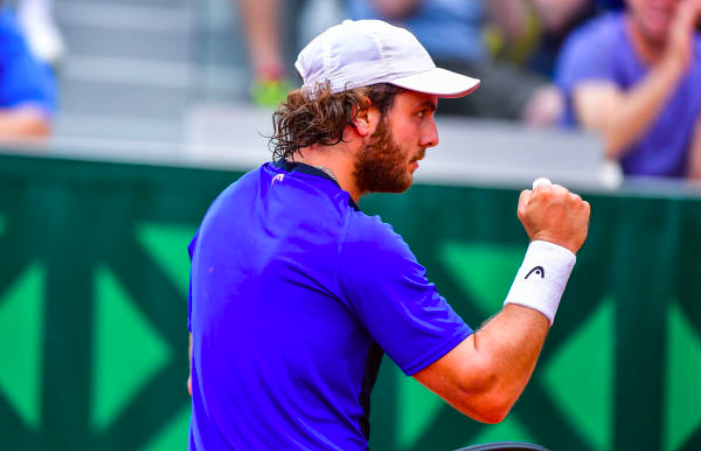
What did you do after those three days?
I got off the next Challenger, took a week off, and stayed at home. Then, in the next two tournaments I participated in, I became the champion: Austria and Romania. The world's best are specialists in recovering very quickly from defeats, they don't make a big deal out of everything that happens to them, focusing more on facts than emotions. In tennis, if you let your emotions control you, it ends up being terrifying.
Terrifying must be thinking about retirement.
I was about to quit several times, I was sick inside. At first, I lived in Argentina and the seasons felt extremely long to me, it was very tough not having a home. I felt a terrible envy for the Europeans who would lose a match and go back home. If there's something I regret in my career, it's not having moved to Europe earlier. This happened to me when I was 25, but then I hit another low at 30, during the COVID era, when I was ready to leave.
Why didn't you leave?
Because I would have left with an impossible thorn in my heart. After giving so much to this sport, I needed something in return, so I didn't want to bring all that frustration home. In early 2021, I had a conversation with my wife and decided to give my all that season. Obviously, there's always a matter of ranking and money that motivates you to keep going. Now I'm starting to play well again after a while; it's a combination of several things, but what keeps me alive is the competition. If tomorrow I break a leg and have to retire, this version of Marco who's leaving would be very different from the Marco who was 30 or 25, especially in terms of the joy of life.
If you had to retire tomorrow, would you leave satisfied?
No, no (laughs). I'm not stupid either, now it's a biological issue, I know it's already late. I matured late, but now I can finally control some things that I didn't know before. Today, I feel like I don't have the limitations I had three years ago, neither physically nor mentally. These aspects help keep the fire alive, although I am far from satisfied. We'll see on the day I finish my career.
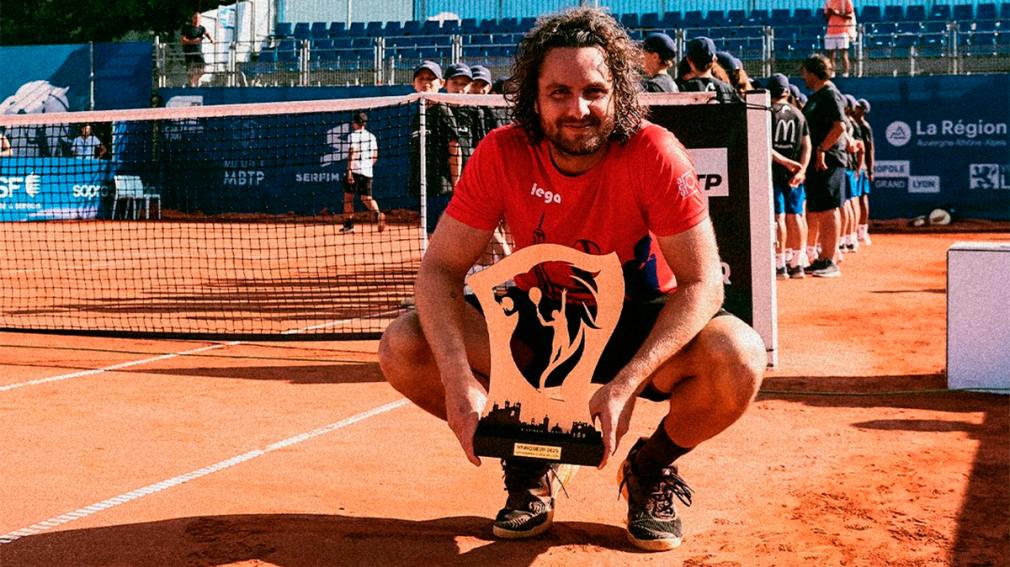
They call you 'Qualy Man'. Do you know how many you played in Grand Slams?
No, more or less...
You played 43 Grand Slam qualifiers, of which you passed 9.
Not bad.
Yet, the top 100 still eludes you.
I would love it, mainly because it's something we grow up with from childhood. According to the system, being in the top 100 means you are good, but this is bullsh*t, even though it's sold that way. It's an ongoing goal, of course, although it may sound strange to pursue something like that at my age. What I aspire to is reaching a level that I couldn't achieve at 30 or 25, that's why I decided to write my own story. The key is to believe that you can keep improving.
You emanate immense enthusiasm, as if you weren't 35 years old.
It is like that, it is true. Sometimes even I surprise myself. Last year I went to play two Challengers in Africa, where I had never been before, but these are the kind of examples that inspire others to try it as well. I think about how Marin Cilic recovered, for example, or how Andrej Martin came back after losing all his ranking. There are many examples out there to look up to, so I like to live in the moment.
What is the secret to keep competing at this age?
I invest a lot in physio, that's why my body keeps responding this way. I face this part of my career with the confidence that all this investment will be what leads me to unlock my maximum level.
How long do you see yourself out there?
I don't know, maybe I'll end up at 50 years old (laughs).

At the end of 2022, you became a father for the first time. To what extent did it change your life?
We didn't know how it would affect us. When my wife got pregnant, I was ranked #150. We talked about it and agreed that if traveling became too hard for me, I would stop. He was born on December 30th, and I spent New Year's Eve with them. On the 1st at 08:00, I was flying to Australia. I'm lucky that my wife is an exceptional person; perhaps a normal person wouldn't have handled it the same way. What we did see as necessary was to cut out mediocrity in our thinking, to stop traveling to tournaments just to see what happens. That's when I started to become more responsible on the court.
How do you manage your schedule?
We agreed that being away from home for more than three weeks was unfeasible in any way. Either they come to the tournament in the third week, or I go back home. This way, we have achieved a beautiful balance, and I don't give myself the chance to miss them. Obviously, it would be ideal to be together all the time, but resources are limited, so we have to adapt.
Every week, we hear complaints from the top players about the schedule, the tournaments, the prize money, etc. Listening to your story, I realize the lack of empathy that still exists on the tour.
Empathy has to be mutual for things to work, for them to fight for the things we need. We will see how all of this ends, but a very clear example is the PTPA, which has been pressuring in recent years thanks to the people in charge above, since we didn't have the resources. With the frenzy in which the circuit moves, I understand that it is difficult to stop and think about the people playing Challenger, things are as they are, those at the top earn more but also spend much more. In our case, it's more about survival, but if you go to the Futures, it's even worse. The process will take some time to fit, until then we will all keep suffering.
It seems like it's all about earning more in the Grand Slams, but what about the rest of the pyramid?
Well, it's strange to think that by playing the first round of a Grand Slam you earn the same as winning an ATP 250, that shouldn't happen, but everything is still very unequal, lacking order. There are also many uncompromising weeks, where people play just because, maybe it's not necessary to play all the time. Why not leave a free week between Roland Garros and the grass court season? [...] There are many things that need correcting, but empathy will always be lacking because we are tennis players, you need to think about yourself. It would be good if it were different, but we need a legal support that is being built, only then can we have a more global, empathy beyond our own minds.
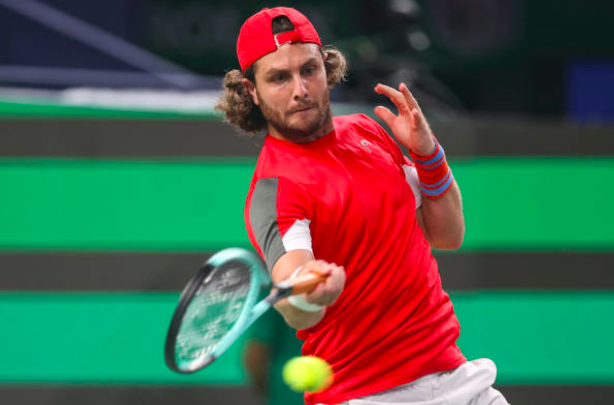
If tomorrow your son wanted to be a tennis player, would you push him in that direction?
Not now... but in ten years, I have faith that things will be much better. Tennis right now is a sport that drains you, it doesn't compare with the amount of effort you have to put in, so it's better to do other healthier things. Here, you depend on your body to eat—if your body breaks, you don't make money, so it's much better not to have to live in this situation. It's one thing if you have to go through it and another if you choose it, but I hope that in 10-12 years all of this will change, although the ITF part is still extremely poor, far from being a decent circuit...
Is it most urgent to boost the ITF circuit?
I don't know if it's the most urgent; it still hurts to hear people at my level say that 'you can make a living' with this ranking. We're talking about a #150 in the world, an elite person. I don't think they should settle for just surviving. Any elite person, in any profession, shouldn't be thinking about these things, especially in a sport that generates as much money as tennis. It might be enough to live for a year, but if the next year you don't achieve the same results, you won't make the same income. You should be paid an amount of money that allows you to be covered for the following season in case you get injured or don't do as well. Nowadays, even if you reach the Grand Slam Qualifiers, if you don't repeat it the following year, you risk starting from zero. Zero for real!
Have you ever ended up with zero in your account?
A few times.
Zero euros?!
Yes, yes. In fact, when I won my first Challenger in Barletta (2018), I had 0€ in my account at the beginning of April. That month we couldn't even afford the rent, but it allowed me to enter Paris and there we were able to improve a little more. The thing is, you never quite make enough of a difference to feel secure and invest in a team that accompanies you all the time. All the investment I make in the physio is to have results: if I don't have those results, the physio can't come anymore. And without the physio, at this age, I can't handle it anymore, I would have to retire. It would be great if we all had access to a certain level of resources, even though each person may be more or less intelligent in using them. If you are in the top100, you have this all the time, but below that, nobody has it. We are improving little by little, but at a dismal speed.
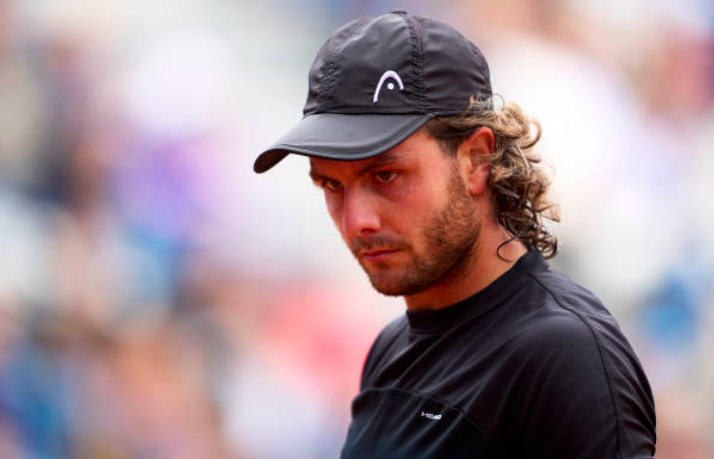
A player like you, who has already had a remarkable career, is still looking for ways to improve?
Always. The day I don't have aspirations to improve, it's over. There will be times when I have to push, weeks where I don't have much energy and go on autopilot, trying to get by somehow, but always thinking that the following week I can go back to seeking that step forward. If you think about it, why do I have my coach come to tournaments? Why the daily report on the work I do? Why the monitoring every week, every training session? Why spend all this money on the physio? None of this would make sense if you weren't trying to improve.
What do you need to improve?
There is a clear aspect that I need to enhance, which I have been working on with (Albert) Portas for a while, and that is my parallel backhand. It's fine now, yes, but I need it to be better if I want to reach the place I aim for.
I know it's still far away, but how do you envision your retirement?
I haven't fully thought about it yet, for now it seems far off, the important thing is that I am at peace [...] For me, it was crucial to reach this point, so that if something happens to me tomorrow, if I get injured and never play again, I will leave in peace. Then there is the other part, reaching the top 100, that would also be very nice, but the truth is I am at peace.
At what moment did you reach that peace?
When I met my wife, I started to have peace (laughs). That's when I started to improve significantly, until our son came along, and then I took another leap. Being a father helped me put tennis in its rightful place of importance; before, it was much higher and had a lot of influence, but now there is a human being who is more important than anything else. Family helped me find that balance, now he is the priority in life, but I want to continue with my profession. It excites me to see him having these experiences of going to the club and watching his dad play.
Let me end with a little game. I'll give you three options, and you choose one.
Go ahead.
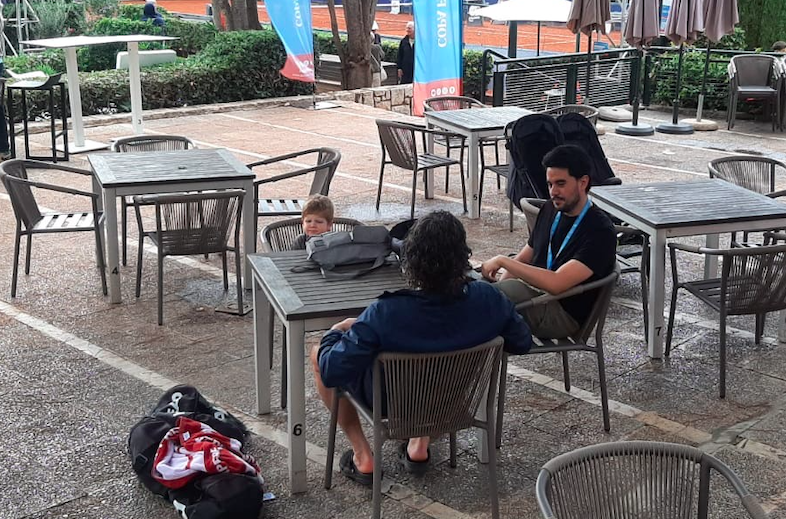
A victory in a Masters 1000. A official victory on grass. A victory against a top 5 player.
Beating a top 5 player, for sure.
It would be the most memorable, yes.
The grass season went well with Wimbledon's Qualy, so that's under control. I played a match once in a Masters 1000. At Roland Garros, I defeated Marin Cilic when he was #10, so I aim for beating a top 5 player. Especially in a Grand Slam, over five sets, where it confirms that you have the level to beat them.
Any preference among the top 5?
Against the No. 1, always (laughs).
This news is an automatic translation. You can read the original news, “Si mañana me rompo y no puedo jugar más, me voy en paz”



